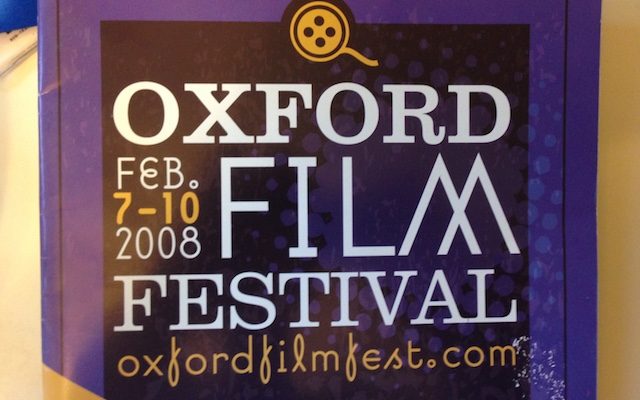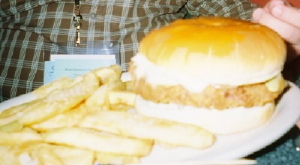
(Part 1)
Kim and Jen went to Wal-Mart again Friday morning, goodness knows why, and then we drove into the heart of Oxford for lunch. At the center of town is a place called The Square, a charming, old-style town square populated by shops and restaurants. It had been recommended that we have lunch at a place called the Ajax Diner. This proved to be the best advice any of us had ever been given, by anyone, at any time, in our entire lives.
The Ajax Diner is locally famous, and the fare is hearty, traditional Southern grub like your momma used to make, assuming your momma was a buttery short-order cook in a diner. I got something called The Big Easy. It’s chicken-fried steak on an oversize bun, with mashed potatoes and gravy — not on the side, but on the sandwich. Pickle chips and butter beans are on it, too. It comes with fries and a defibrillator. Kim and Jen had similar comfort food, reportedly just as delicious as my Big Easy. I used to look down on Mississippi for having the highest obesity rates in the country, but not anymore. Now I nod understandingly and salivate at the thought of shoving another plateful of Ajax Diner food down my gullet.

You may recall that the actual reason I was in Oxford was not to gain 30 pounds (that was a side benefit), but to be on a panel, the title of which was “Film and the New Media: Writing About Film in Print and for the Blogosphere.” I was honored to participate in the panel, and that honor was only slightly diminished by the knowledge that they had actually wanted someone else. I felt a lot of pressure to say something insightful and intelligent, considering how much money had been spent on my plane ticket and hotel room. Some of that money was Donna Ruth’s. I didn’t want to let her down!
The panels were being held in a lecture room on the Ole Miss campus. In addition to me, Kim, and Jen, the panel included: Godfrey Cheshire, a film critic and filmmaker, and a North Carolina native, which possibly explains his being named “Godfrey Cheshire”; and Gary Myers, an Ole Miss law professor with a specialty in media law. Paul Cullum, a writer for Variety, was supposed to be there but couldn’t make it. In a way this was a good thing, as it meant we could make fun of Variety all we wanted.
Our panel went pretty well, I think. It was a good, lively discussion, punctuated by someone asking a “question” that turned out to be nothing more than an excuse to mention that his film was playing in the festival and to hurry to the front of the room to give us each a DVD copy of it. I admired his tenacity but found his behavior tacky. This is also how I feel about panhandlers, and George Bush.

After the panel we headed over to the theater to see a documentary called “America Unchained.” It was made by a British guy named Dave Gorman, who I knew from a show he did once where he told the story of trying to meet 52 other Dave Gormans. This time, his plan was to drive from California to New York without ever giving any money to The Man: no chain restaurants, chain hotels, or chain gas stations, only Mom-and-Pop businesses. In so doing, he discovered small-town America, with its decent, hard-working people and their questionable fashion choices. I hate it when foreigners criticize America; in contrast, I love it when they find things to praise about it. It makes me feel patriotic to remember how awesome we are.
But who cares about movies? We were here for the parties. Tonight’s was at an art gallery on The Square, with food no less spectacular than the previous night’s had been. There was a variety of fancy meats and cheeses and crackers, with grilled chicken on a stick and a heavenly sauce to dip it in. At the center of it all was an unusual spread for crackers. Like the scent of flowers in Donna Ruth’s house, this spread was the subject of much conversation. We eventually learned that its primary ingredients were goat cheese and rosemary, with figs involved somehow, and the amazing thing is that even though I don’t like any of those things, I LOVED THIS SPREAD. It was sweet and tangy and tart and pleasant. I wanted to strip naked, cover myself in it, then use crackers to eat my way clean again, and had it not been for the room’s chilliness, I’d have done just that.
Donna Ruth was at this party, of course, greeting all her new friends from the previous night, wineglass in hand. She cemented her status as my New Favorite Person when she told me that she’d spent the day filming a campaign commercial for some local Republican politician whom she supported. The director had painstakingly arranged Donna Ruth and other supporters so they surrounded the candidate in a fake-looking tableau, but then had been dissatisfied with the result, exclaiming, “It looks staged!” Donna Ruth said, “Well, s*** yeah, it looks staged. You just staged it!” Whether she actually said that at the time or was simply telling me now what her thoughts had been didn’t matter. Either way, she’s a pistol.
Also at the party, and helping out with the arrangements, were some of Oxford’s elite. Oxford’s elite women all have perfect noses and feathered, dirty-blond hair; they look like the players’ wives you see in the stands at football games. Oxford’s elite men, meanwhile, look like good ol’ boys, former athletes stuffed into suits. Every one of them could be a lawyer, and in fact we noticed a disproportionate number of law offices on The Square. You could picture any one of these guys in court, his thumbs under his suspenders, maybe pulling out a handkerchief to wipe the sweat off his forehead, doing that folksy thing with the jury: “Friends, I don’t know about no ‘probable cause’ or ‘reasonable doubt.’ I’m just a simple Mississippi boy. But I do know that my client is as inn-oh-cent as a newborn baby calf.”
While we cavorted in the art gallery, we realized why we had seen so few Ole Miss students on campus earlier in the afteroon: they were all taking naps to prepare for the heavy-duty partying they were now doing at the bars all around The Square. Surely this level of debauchery cannot be accomplished without preparing oneself beforehand. The only thing they were celebrating was the fact that it was Friday, but they celebrated with the fervor and drunkenness of Mardi Gras, Spring Break, and the assassination of Lincoln, all rolled into one. Frat boys leaned out of car windows and shouted incoherently at passersby. Sluttily dressed sorority girls went “Wooooo!” while stumbling around on stiletto heels. The Square became an impassable cluster of tipsy, perfumed bodies — and the film festival had nothing to do with it. This was all Oxford.
Ole Miss is known as a party school, and it was living up to its name. There’s a place in town called the Rebel Barn, which is an old barn with two drive-through lanes so that you can buy beer without getting out of your car, which is such a ridiculously bad idea that it’s no wonder someone tried it. It is right next to Ole Miss, and of course the “Rebel” is the university mascot, so there’s no ambiguity about who the Rebel Barn is targeting. Now those college students were doing what they apparently do every Friday night, and it was a sight to behold. One of our friends stumbled into our party having just come from one of the local bars, and he looked shell-shocked, like he’d teleported from an ancient Roman bacchanal.
Having stuffed myself with as much food as I possibly could, it made little sense to go to another party and eat some more, but hey, as the old saying goes, “When in Rome, eat like a damn pig.” We trundled a few blocks over to some dude’s house, a rustic old place with a lot of charm and not much standing room, where the front door leads into the bedroom (where there is also a piano), and from there into a living room and kitchen. As the house filled up with festival people coming over from the art gallery, we spilled out into the yard, where a bonfire was built. The host’s wife had made something called chess squares, whose main ingredients were cream cheese, powdered sugar, yellow cake mix, and, I believe, crack cocaine. It was incredibly delicious, and I ate 1,000 pieces of it. The festival supplied plenty more food, including whatever was left from the art gallery, with the new addition of chicken fingers and fried pickles. I never thought I would like fried pickles. Now I realized that my counter-instinct was right: Anything tastes good if it’s deep-fried.
* * *
Saturday was more of the same: another trip to Wal-Mart and another lunch at the Ajax Diner. The Square looked no worse for the wear from the previous night’s collegiate revelry, with the exception of an SUV on which someone had used soap to write a message on the back window. In an ingenious parody of the “How’s my driving?” stickers you often see on commercial vehicles, this prankster had written “How’s my penis?” Accompanying it was a drawing of a penis and a local phone number that you could call to register your complaint or compliment. Ah, college.
At 4:00 we went to a showing of “Quiet City,” a movie that had played at a few other festivals but that none of us had seen. We’d met the filmmakers at one of the parties and promised we’d try to see their movie; somewhat coincidentally, we then actually saw their movie. (You always tell the filmmakers you’ll try to see their movie, even if you have no intention of doing so. What else are you gonna say? “No, sorry, your movie sounds awful” isn’t really polite party conversation.)
“Quiet City” is an example of a new movement in filmmaking called “mumblecore,” in which directionless hipster twentysomethings have trivial conversations while meandering around town, always filmed with handheld cameras, natural lighting, and semi-improvised dialogue. In the Q-and-A afterward, the filmmakers tried to distance themselves from the “mumblecore” label, I guess because no one likes being pigeonholed — but it was kind of a funny protest to make, since “Quiet City” has every single characteristic of a mumblecore film. It was like someone making a movie in which the characters frequently burst into song, then saying, “I wouldn’t call it a ‘musical’…” Too bad, because that’s what it is.
We all really liked “Quiet City,” whatever genre it belongs to, but the old people sitting in front of us did not. I wouldn’t expect them to. This type of movie speaks directly to a particular age group, and people born in the 1890s do not qualify. I can’t even fault them for speaking out loud during the movie, in conversational tones, making no attempt whatsoever to whisper or keep their comments quiet; after all, when they were young, movies did not exist. They probably just were never taught the proper etiquette for moving-picture shows. Frankly, I’m glad they didn’t declare talking pictures a tool of the devil, rally a mob, and set the theater on fire. Ah, old people.
Crazy coincidence: Aaron Katz, the writer and director of “Quiet City,” is from Portland, where I live now, and so is Scott Prendergast, writer and director of “Kabluey.” It was fun to chat with them at the parties about Portland-related things — you know, where to buy weed, how to organize a flag-burning, stuff like that.
Saturday night was the film festival’s award ceremony and party, to be held at a community arts center on University Avenue. We arrived to find people already nibbling at the buffet table (well, at the food on the table) and availing themselves of some pre-ceremony drinks courtesy of the open bar. Soon everyone was corralled into the theater area and the show began. Blessedly, it was not terribly long (you know how award shows can be), and it was enlivened by some fun video clips and a performance by the Jones Sisters, a local a cappella gospel group.
“Kabluey” won the jury award for best narrative feature; I’d probably have rated it juuuust below “Quiet City,” but it would have been close. Who knows, maybe those old people were on the jury. Scott Prendergast seemed delighted to have won, and if I were more of a gossip-monger I would point out how completely hammered he was at the award ceremony. But I am not that kind of writer, and his drunken, slovenly ways will not be fodder for this column.
The party was another lively one, with the centerpiece being the huge buffet table loaded with food from several local restaurants and caterers. And not to be redundant, but sweet Bubba’s moonshine, do they know how to cook down here! I’m considering moving to Mississippi just so I can fulfill my lifelong dream of being the world’s fattest man … the world’s fattest, happiest man.
A local DJ was playing music in the theater, and soon the stage was crowded with people dancing. At Kim and Jen’s behest, even I spent a few minutes up there shaking my moneymaker (a term that is inapt in my case, as I do not derive any income from it. In fact, considering the expense of maintenance and upkeep, I believe my so-called “moneymaker” actually costs me money).
The midnight party was at some dude’s house again, a different dude this time. The houses on his street weren’t numbered, and the only way we could tell we were at the right place was that a couple dozen people were already congregating on the porch and front lawn — but then we realized we weren’t entirely sure that those people knew they were at the right place, either, because no one had actually gone inside, nor had the house’s occupants come outside. For all we knew, the film festival party-goers had simply squatted at some random house and the homeowners were inside, cowering in terror. But it turned out to be the right place, and the reason the dude whose house it was hadn’t come outside or let anyone in yet was just that … well, I never did learn the answer to that question. His was yet another house where you have to go through the bedroom to get to the kitchen, so obviously they have their own way of doing things down here.
Kim and Jen and I were all very tired, and this party was quickly becoming crowded. We were leaving the next morning, though, so we wanted to stick around long enough to say farewell to our new Oxford friends. As we were mingling outside, a festival volunteer pulled up in her pickup truck, which was loaded with all the food for the party. She barged up to the group of us and started bossing people around. “I need some big strong men to help me carry all this food inside,” she said. Nobody moved very fast, so she said it again and started singling people out. Jen refused to help, on the grounds that the woman had asked for men specifically. I used the same excuse. What, a woman can’t carry food? Why you gotta be sexist, y’all?
We left a few minutes later, only instead of going back to the hotel, which is where we should have gone given that it was 1 in the morning, we went to get something to eat at the Huddle House. The Huddle House is one of the few places in Oxford open late. It’s a chain restaurant, an imitation of Waffle House, which itself is an imitation of Denny’s (which itself is an imitation of picking scraps out of a dumpster). The Huddle House proved to be the only place in Oxford where we’d seen any sizable gathering of black people, not counting Donna Ruth’s art collection. Considering one-fifth of the city’s population is African-American, you’d think there would be more sightings. I guess we just didn’t go to the right parts of town — but then again, how many “parts” can a town of 17,000 really have?
* * *
Our stay in Oxford was over the next morning. We drove back up to Memphis, had lunch at Jim Neely’s Interstate Barbecue (considered to be one of the best barbecue places in the country), returned the rental car, and went our separate ways to our separate flights.
The more I find out about Oxford, the more I wish I’d had more time to explore it. I’d like to visit William Faulkner’s grave, for example, or go to Square Books, consistently ranked among the best independent bookstores in the country. (We walked past it a few times on The Square, but I didn’t realize its significance.) I also want to go to Graceland Too, about 30 miles from Oxford, where a crazy Elvis fan has turned his home into a shrine and grants tours at all hours of the day or night. (The real Graceland, in Memphis, I have little interest in.)
I want to stop in at the business we drove past several times that appears to be both a bail bondsman’s office and a barbershop. Does this combination fill a particular need in Oxford? Does local custom prescribe a fresh haircut before getting your buddy out of jail? Do the same employees handle both sides of the business? Can you walk in and say, “I need a thousand dollars, and a little off the top”?
I said at the beginning that they may not be entirely at peace with the less savory aspects of their heritage here in Mississippi — but then again, who is? Nobody anywhere belongs to a culture that doesn’t have some uncomfortable and embarrassing incidents in its past. How you behave now is a lot more important than how your ancestors behaved 150 years ago. And while mocking the benighted yokels who populate our Southern states is easy, not to mention fun, the fact is I enjoyed every minute I spent in Oxford — not in an ironic, condescending, “look at the hicks” kind of way, but honestly and truly. The town is charming and friendly and colorful, and I believe I may have mentioned the quality of the food.
Michelle at the film festival said they’d love to have us back as panelists again next year, and I know she’ll remember. Because if there’s one thing I learned in Dixie, it’s that old times there are not, in fact, forgotten.




